Baker New Testament Studies Collection (12 vols.)
Digital Logos Edition
Overview
Explore the literary, historical, and theological factors which have shaped the study of the New Testament in the past century. With titles by John Piper, D. A. Carson, Ben Witherington III, and Scot McKnight, the books in the Baker New Testament Studies Collection explain the most pressing issues in the study of the New Testament. The Baker New Testament Studies Collection includes books on the historical Jesus, the New perspective on Paul, the Dead Sea Scrolls, and other issues which have attracted mainstream attention to the study of the Bible. This collection also brings you the best in exegetical studies, New Testament surveys, and the newest edition of D. A. Carson’s New Testament Commentary Survey.

- Examines issues that the Dead Sea Scrolls have raised
- Addresses key issues surrounding the exegesis of Galatians and the other Pauline Epistles
- Provides an introduction to the New Testament
- Surveys the history and culture of the world of Jesus
- Presents an insightful survey of the Apostle Paul’s thought world
- Title: Baker New Testament Studies Collection
- Publisher: Baker
- Volumes: 12
- Pages: 3,132
- The Justification of God: An Exegetical and Theological Study of Romans 9:1–23
- A New Perspective on Jesus: What the Quest for the Historical Jesus Missed
- Christian Beginnings and the Dead Sea Scrolls
- Interpreting Galatians: Explorations in Exegetical Method
- Making Sense of the New Testament: Three Crucial Questions
- New Testament Commentary Survey
This title is included in the following collections
You can save when you purchase this product as part of a collection.
Baker Ultimate Collection 2022...
$38,273.89$30,599.99
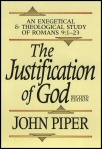
Undergirded by the author’s belief that the sovereignty of God is too precious a part of our faith to dismiss or approach weak-kneed, this book explores the Greek text and Paul’s argument with singular deftness.
I find The Justification of God the most compelling and forceful exposition of Romans 9:1–23 that I have ever seen. The Justification of God brings together the best scholarship on and exegesis of Romans 9.
Richard Muller, P. J. Zondervan Professor, Calvin Theological Seminary
Written in an irenic spirit with a keen awareness and interaction with all significant scholarly studies on Romans 9. Theology aside, it is a work of scholarship in its own right and the best on Romans 9.
—G. K. Beale, PhD Professor of New Testament and Biblical Theology, Gordon-Conwell Theological Seminary
Piper leads one through complex exegetical issues, engaging important literature fairly, summarizing the arguments frequently, and stating his conclusions (and warrants) clearly.
—Leander Keck, Winkley Professor Emeritus of Biblical Theology, Yale Divinity School
Even for non-Calvinists Piper’s work is too carefully reasoned and stays too close to the text to be ignored.
—David Dunbar, president and professor of theology, Biblical Theological Seminary
John Piper has been the pastor for preaching and vision at Bethlehem Baptist Church in Minneapolis, Minnesota, since 1980. He is a widely respected theologian and bestselling author. Piper attended Wheaton College where he majored in literature and minored in philosophy. He completed his bachelor of divinity at Fuller Theological Seminary, where he studied under Dr. Daniel Fuller. Piper received his doctorate in theology from the University of Munich and taught biblical studies for six years at Bethel College. His preaching and teaching is featured daily on the radio program, Desiring God. His writings and sermons are available from Logos in the John Piper Collection (24 Vols.) and the John Piper Sermon Manuscript Library.
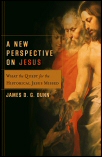
In A New Perspective on Jesus, renowned author James D. G. Dunn critiques the quest for the historical Jesus. He claims that the quest has been largely unsuccessful because it started from the wrong place, began with the wrong assumptions, and viewed the evidence from the wrong perspective.
Dunn’s study offers three criticisms of questers’ methods. First, Dunn contends that scholars have failed to see how the disciples’ pre-Easter faith shaped the Gospel traditions. Second, he claims that a focus on literary transmission has led scholars to ignore the fact that the Gospel traditions arose in an oral culture, which shaped the way the stories of Jesus were told and passed on. Third, Dunn challenges scholars’ preoccupation with finding what is distinctive about Jesus and rejecting portions of the tradition portraying Jesus as characteristically Jewish. Dunn concludes by rethinking accepted views of Synoptic relationships in light of the oral nature of the Jesus tradition.
This work offers a compelling critique of the presuppositions that inform much of contemporary Gospel study, and the alternatives Dunn proposes are sure to stimulate scholarly debate. It will interest students and scholars of the Bible, pastors and church leaders, and anyone wanting a fresh perspective on Jesus studies.
Although this is a small book, the issues are large, and Dunn’s critique of so much that historians of Jesus still take for granted is salutary. He thoughtfully asks the hard questions, and his informed answers not only orient us in the right direction but outline further paths for research.
—Dale Allison, Errett M. Grable Professor of New Testament Exegesis and Early Christianity, Pittsburgh Theological Seminary
What Dunn did for Pauline studies, when he called for a ‘post-Sanders new perspective,’ he is now doing for historical Jesus studies. Dunn’s ‘new perspective’ on Jesus is post-tradition criticism and contends that the foundation of the Jesus traditions was shaped by faith. There never was a historical Jesus who could be understood apart from faith. This book summons the academy to the table and contends that it has been epistemologically irresponsible.
—Scot McKnight, professor of religious studies, North Park University
A New Perspective on Jesus takes a serious look at the Jesus tradition in its earliest form as oral tradition. The impact of faith, the nature of oral communication, and a focus on the ‘characteristic’ Jesus are affirmed in a context where faith is often undervalued, form and redaction criticism are said to rule, and the ‘dissimilar’ Jesus is treated as the authentic Jesus. This work brings needed balance to a study of Jesus that is often out of whack.
—Darrell Bock, research professor of New Testament studies and professor of spiritual development and culture, Dallas Theological Seminary
At last, here is an accessible book by a noted New Testament scholar who takes seriously, and thus builds a strong case for, the role of orality/aurality among the early followers of Jesus. In doing so, Dunn also builds a strong case for the essential reliability of the Gospel materials. I am glad to commend this book as an introduction to the study of Jesus and the Gospels.
—Gordon Fee, professor emeritus of New Testament studies, Regent College
The past 25 years have brought a Copernican revolution in our understanding of Jesus. We now know that Jesus was Jewish by cultural commitment as well as by birth, that his disciples conveyed this perspective in their teachings, and that his disciples taught by word of mouth—not in writing—during the earliest years of Christianity. In this accessible book, Dunn provides a lucid introduction to one of the intellectual pivots in the present generation of scholarship.
—Bruce Chilton, Bernard Iddings Bell Professor of Religion, Bard College
James D. G. Dunn (PhD, University of Cambridge) is Emeritus Lightfoot Professor of Divinity at the University of Durham. He is the author of numerous books, including The Theology of Paul the Apostle, Jesus Remembered, the commentaries on Romans in the Word Biblical Commentary, the commentary on Colossians and Philemon in The New International Greek Testament Commentary, and the commentary on Galatians in Black’s New Testament Commentary.
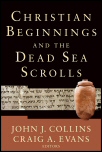
The Dead Sea Scrolls, discovered more than half a century ago, have proved to be the most important modern discovery related to biblical literature, Judaism of late antiquity, and nascent Christianity. The scrolls have made an important contribution to our understanding of the development of the text and canon of Scripture, including such issues as textual preservation and transmission. They have also contributed to our knowledge of doctrine, especially pertaining to law and eschatological expectations.
In this volume, six leading scholars—John Collins, Craig Evans, Martin Abegg, R. Glenn Wooden, Barry Smith, and Jonathan Wilson—examine some of the major issues that the Dead Sea Scrolls have raised for the study of early Christianity. Were first-century Jews expecting a messiah? Were other messiahs mentioned in the scrolls? Were key early Christian symbols also found in the Judaism of Qumran? Did the Jews of Jesus’ day believe in salvation by works? In the Holy Spirit? How did the New Testament authors think about inspired interpretation? These cutting-edge articles explore the impact of the Scrolls on Christianity, delving deeper than most surveys on the Dead Sea Scrolls.
To what extent have the Dead Sea Scrolls revolutionized scholars’ comprehension of Christian origins? Authors have befogged a view of answers because they have rushed to print, and most of their conclusions are premature and absurd. Contributing to this volume, however, are scholars who can be trusted. Some of their insights reveal a paradigm shift in the understanding of early Judaism and early Christianity. These essays, often by luminaries in the field, are valuable and often exciting. Highly recommended.
—J. H. Charlesworth, George L. Collord Professor of New Testament Language and Literature, Princeton Theological Seminary
Out of the massive range of topics available from the Qumran and New Testament supermarkets, a very tasty six-course menu has been well chosen, ingredients finely blended, spices added at appropriate points, and all served up with Acadian quality, the whole very satisfactorily rounded off by a John Collins special liqueur—very appetizing indeed.
—James D. G. Dunn, Emeritus Lightfoot Professor of Divinity, University of Durham
Christian Beginnings and the Dead Sea Scrolls offers to the reader an unusual variety of essays. Some correlate texts in a historical manner, while others consider questions of a more theological nature. The result is an interesting, diverse, and profitable contribution to the study of both the Qumran scrolls and the New Testament.
—James C. VanderKam, John A. O’Brien Professor of Theology, University of Notre Dame
These stimulating essays will bring many readers up to date on several key issues where the Dead Sea Scrolls are important for a better understanding of the New Testament. What emerges clearly in these studies is that the communities behind the Scrolls and the New Testament writings appealed to a wide range of scriptural motifs that are the primary basis for their own self-understandings. It is the varied use of these motifs, not any kind of literary dependence that most obviously explains both the similarities and the differences between these communities. Sensible and detailed, clear and accessible, this is a worthwhile contribution to a better appreciation of one dimension of the Jewish context of Christian origins.
—George J. Brooke, Rylands Professor of Biblical Criticism and Exegesis, University of Manchester
John J. Collins (PhD, Harvard University) is Holmes Professor of Old Testament Criticism and Interpretation at Yale Divinity School. He is also author of the commentary on Daniel in Hermeneia.
Craig A. Evans (PhD, Claremont Graduate University) is Payzant Distinguished Professor of New Testament Studies at Acadia Divinity College. He is the editor of The Interpretation of Scripture in Early Judaism and Christianity: Studies in Language and Tradition, co-editor of four volumes in the Sheffield Reader Collection (12 Vols.), and author of Word and Glory: On the Exegetical and Theological Background of John’s Prologue.
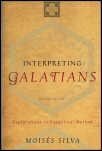
Interpreting Galatians addresses the key issues surrounding the exegesis of Galatians and the other Pauline Epistles, exploring how literary, historical, and theological factors influence interpretation. This second edition features a new appendix and will be welcomed by all those studying the Pauline Epistles.
New Testament scholars are confronted by many and diverse approaches to the text—linguistic, literary, historical, and theological. All too often such methods are uncritically or separately applied. In this well-written yet detailed book, Silva introduces the ways in which these approaches should be harnessed for our understanding of what the biblical authors intended. We are given hands-on experience with examples taken from Galatians. Readers are encouraged to apply his insights and critical judgments to other New Testament texts. Silva’s timely book will help students and pastors. It is warmly welcomed.
—J. K. Elliott, professor of New Testament textual criticism, University of Leeds
This volume is packed with information seasoned with sound advice. ‘Exegetical method’ carries a very wide sense—not just instructions on word study and sentence diagramming, but ‘explorations’ into mirror reading, linguistic theory, discourse analysis, and history of interpretation. Silva’s survey maintains the big picture but avoids oversimplifications and abstraction by concentrating on Galatians as a test case. Take up and read—you’ll learn a lot about Galatians, and much else too.
—Robert H. Gundry, scholar-in-residence and professor emeritus of New Testament and Greek, Westmont College
Silva has mastered the literature on Galatians from Aquinas to Zuntz, and offers wisdom from his years of research that the scholar will find invaluable. Students will also breathe a sigh of relief over his clear style and unpretentious, often humorous, approach to the subject. Both scholar and student will benefit from the example of erudition and humility characteristic of everything Silva writes.
—Frank Thielman, New Testament scholar and the Presbyterian professor of divinity, Beeson Divinity School
Many books are written today on how to do exegesis, and yet students are often frustrated by their abstract character. Silva’s work is distinctive, for he shows how to interpret the text by using Galatians as a case study. He offers sage advice on interpretive philosophy, textual criticism, Greek syntax, historical background, Pauline theology, and more! I learned much from this wise book, and I commend it enthusiastically to others.
—Thomas R. Schreiner, James Buchanan Harrison Professor of New Testament Interpretation and associate dean of Scripture and interpretation, Southern Baptist Theological Seminary
Moisés Silva (PhD, University of Manchester) has taught New Testament at Westmont College, Westminster Theological Seminary, and Gordon-Conwell Theological Seminary. He is author of the volume on Philippians in Baker Exegetical Commentary on the New Testament.
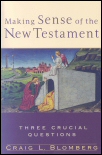
Many Christians assume that the New Testament is historically reliable. This confidence, however, is not universal, and there are many who, especially in light of modern biblical studies, question this claim. Some have also claimed that Paul founded a church quite distinct from the message of Jesus and the Gospels. How can we reconcile their seeming differences? What is the relevance of the New Testament in the world today, in cultures far removed in time and space from the first-century Mediterranean world?
Grounded in sound scholarship but written in an accessible style, this book provides a reasonable, well-informed response to these issues, offering sound introductory guidance to any student of the Bible.
As always, Craig Blomberg is lucid, sensible, and interesting. The book’s organization and style are deceptively simple. Even the mature Christian reader will benefit from Blomberg’s mastery of so much material nicely summarized and evaluated here. Blomberg offers just enough detail to keep us interested in the hard evidence but not so much as to make us feel swamped by minutiae. This book could be confidently placed into the hands of friends who are generally well read but who are nevertheless biblically illiterate, for Blomberg’s mix of sane historical assessment, thoughtful theology, and elementary principles of interpretation open many doors. I hope this book will find many diverse readers and a long life.
—D. A. Carson, research professor, Trinity Evangelical Divinity School
Some New Testament scholars major in minutiae and stay away from the big historical and literary questions, but Blomberg is not one of them. In Making Sense of the New Testament, Blomberg tackles the big issues of the historical reliability of the New Testament—the similarities and differences between the teachings of Jesus and Paul and the various issues of literary criticism—with vim, vigor, and vitality. His study is marked by careful, well-documented scholarship and a well-argued case. This book is an excellent starting place for those who want to discuss the New Testament with a skeptical postmodern audience.
—Ben Witherington III, professor of New Testament interpretation, Asbury Theological Seminary
Craig Blomberg is an ideal scholar to introduce the three crucial questions addressed in this book. He has distinguished himself before in important treatments of these topics, and here he provides an excellent, readable introduction that will profit basic and advanced readers alike. His treatment reflects exceptionally clear, original thinking as well as thorough familiarity with wider scholarly discussion.
—Craig Keener, professor of New Testament, Asbury Theological Seminary
In addressing three crucial questions, Blomberg has given us an imposing, crisply written apologetic that is at once relevant, fair-minded, and comprehensive. This is a worthy companion to Longman’s parallel text for the Old Testament.
—Paul Barnett, teaching fellow, Regent College
Craig L. Blomberg (PhD, University of Aberdeen) is a distinguished professor of New Testament at Denver Seminary, where he has taught for more than 15 years. He is the author or editor of more than 10 books, including Jesus and the Gospels and Interpreting the Parables.
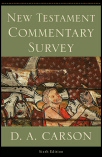
This much-anticipated sixth edition of the New Testament Commentary Survey offers students and pastors an updated look into available resources on the New Testament. Pastors, seminarians, and theology students will eagerly welcome this invaluable tool into their biblical studies libraries. In this succinct yet thorough survey, Carson examines sets, one-volume commentaries, and New Testament introductions and theologies, before offering extensive comments on the available offerings for each New Testament book, noting intended audience, levels of difficulty, and theological perspective. He records the publisher, price, and current publication status, identifies those texts he considers overpriced, and advises readers when to delay purchase for forthcoming works. The book concludes with a useful section where Carson indicates the most valuable works for each individual New Testament book.
The multiplication of commentaries and monographs on individual books of the New Testament, and the difficulty of discerning the wheat from the chaff, makes this book a valuable resource indeed—a must read for the student or pastor who is building his or her library. Don Carson’s expert guidance will save the beginning student from many bad purchases. . . Carson certainly provides all one needs to arrive at a ‘short list’ of necessary resources and to be acquainted with the potential pitfalls and strengths of most books that a student might encounter in the course of researching an exegetical paper. This book is highly recommended.
—David A. deSilva, Trustees’ Distinguished Professor of New Testament and Greek, Ashland Theological Seminary
Numerous students, ministers—and, I suspect, theological teachers—will have used previous editions of this invaluable little book. . . As a reference tool, Carson’s book is a gold mine of informed judgment. It is a great strength of the book that Carson does not place value on a book because it confirms his theological position but because it helps the careful and critical reader better understand the biblical text. Yet Carson is prepared to indicate clearly where an author’s presuppositions or methods influence his or her approach to the text in a negative way. In fact, to read through this book is to get a concise introduction to trends and key players in contemporary NT studies. . . If you have any intention of building up a personal library on the New Testament that is full of tools which are effective in aiding you to understand the meaning of the biblical text, read Carson before you spend your money. You may not always agree with his comments but you will be helped to make more informed choices.
—Themelios
This is the most useful survey of New Testament commentaries currently available.
—John F. Brug, professor of systematic theology and Old Testament, Wisconsin Lutheran Seminary
Carson’s work is most valuable and his perceptive remarks will serve pastors and students well.
—David S. Dockery, president, Union University
[An] eminently useful survey. . . The author has developed a running narrative approach which is refreshing and much more readable than the traditional bibliographic method. . . This work is highly recommended for both its informative value and the unique accomplishment for a bibliography, it is interesting and entertaining to read.
—Dennis M. Swanson, vice president for Library and Educational Assessment, The Master’s Seminary
D. A. Carson (PhD, University of Cambridge) is a research professor of New Testament at Trinity Evangelical Divinity School. He is author or editor of numerous books, many of which are found in the D. A. Carson Collection and the D. A. Carson “Love of God” Collection.
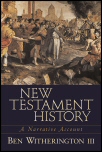
Essential to an understanding of the New Testament is a comprehension of the individuals, events, and social movements that shaped the setting from which Jesus and his followers emerged. Unfortunately, many accounts by historians can leave readers feeling overwhelmed and confused. New Testament History provides a worthy solution to this problem. A well-known expert on the social situation of the New Testament, Ben Witherington offers an engaging look into the world that gave birth to the Christian faith.
This is a very readable and informative survey of the rise of Christianity against its historical background. I can think of no higher praise than to say that this book may well do for this generation what F. F. Bruce’s New Testament History did for an earlier one.
—I. Howard Marshall, Honorary Research Professor of New Testament, University of Aberdeen
A well written and informative overview not only for theologians and specialists but also for every educated and interested reader. It gives a fine introduction to the time of Jesus and the apostles and includes several new historical and archaeological insights. The numerous illustrations are also valuable.
—Martin Hengel, emeritus professor of New Testament and ancient Judaism, University of Tübingen
New Testament History fills a significant gap in biblical background textbooks. This well-written book, with its choice photographs, maps, and sidebars, will engage and enlighten students painlessly! I recommend it enthusiastically.
—Craig A. Evans, Payzant Distinguished Professor of New Testament, Acadia Divinity College
This is a fine choice for undergraduates and lay church members, as well as more advanced students, who will most appreciate Witherington’s sensitivity to the complexities of history.
—Publishers Weekly
An engaging narrative replete with clear maps and judiciously chosen excerpts from many sources such as Josephus and Qumran.
—Fred W. Burnett, Religious Studies Review
This book should prove useful in college-level New Testament survey courses, and general readers should find it useful as well. Witherington does what he sets out to do, and with economy and clarity.
—Near East Archaeological Society Bulletin
Ben Witherington III (PhD, University of Durham) is a professor of New Testament at Asbury Theological Seminary. He is the author of over 20 books, including The Jesus Quest, and numerous books in the Socio-Rhetorical Commentary Series.
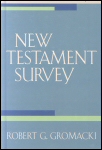
Before coming to grips with an individual verse or passage in the New Testament, Bible students and expositors must understand how it relates to the theme of the book. Robert Gromacki’s New Testament Survey provides a solid foundation for in-depth exegesis of each book in the New Testament.
“The purpose of [this] survey,” the author writes, “is to give a working understanding of the message of the New Testament books. . . My goal has been to make the complex simple and to say much in few words.”
This text represents a true survey. It provides an introduction to the New Testament, free of technical discussion. It incorporates historical and cultural backgrounds without becoming a book on manners and customs, and it deals with the actual text of Scripture without becoming a verse-by-verse commentary. This balanced presentation avoids skimming the surface or getting bogged down in insignificant details.
The first chapter explores the first-century historical background, social and economic conditions, Gentile religions and philosophies, and Judaistic practices. In the next two chapters, the author discusses the entire New Testament corpus as a whole and the Gospels in particular.
The remaining 27 chapters cover each of the New Testament books. After presenting introductory data for each book, Gromacki provides a detailed outline and a summary commentary. Each chapter concludes with an “Increase Your Learning” section, which presents both individual projects and topics for further discussion. A list of recommended commentaries follows.
Robert G. Gromacki is a distinguished professor of Bible and Greek at Cedarville University. He has written expositions of eight New Testament books, including 1 Corinthians, Galatians, Philippians, and Hebrews. He is also a contributing author to Understanding Christian Theology.
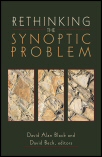
The problematic literary relationship among the Synoptic Gospels has given rise to numerous theories of authorship and priority. The primary objective of Rethinking the Synoptic Problem is to familiarize students with the main positions held by New Testament scholars in this much-debated area of research.
The contributors to this volume, all leading biblical scholars, highlight current academic trends within New Testament scholarship and update evangelical understandings of the Synoptic Problem.
An exciting and readable overview of the present state of the Synoptic problem. The entries are balanced, probing, and incisive, making the volume a valuable introduction for all who would learn more about the knotty but inescapable enigma at the heart of the Gospels.
—David Dungan, University of Tennessee
This set of essays by first class conservative New Testament scholars constitutes a fine case study of competing views on the Synoptic debate. This volume is eminently fair and helps the reader sort out complex evidence in the study of Gospel parallels. A commendable attitude of humility attends the discussion, but all participants reject postmodern deconstruction of the Gospels’ historicity.
—Royce G. Gruenler, professor emeritus of New Testament, Gordon-Conwell Theological Seminary
David Alan Black (DTheol, University of Basel) is a professor of New Testament and Greek at Southeastern Baptist Theological Seminary. He is also author of New Testament Textual Criticism: A Concise Guide
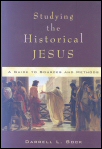
Interest in the historical Jesus continues to occupy much of today’s discussion of the Bible. The vexing question is how the Jesus presented in the Gospels relates to the Jesus that actually walked this earth.
Studying the Historical Jesus is an introductory guide to how one might go about answering that question by doing historical inquiry into the material found in the Gospels. Darrell Bock introduces the sources of our knowledge about Jesus, both biblical and extra-biblical. He then surveys the history and culture of the world of Jesus. The final chapters introduce some of the methods used to study the Gospels, including historical, redaction, and narrative criticisms.
Bock, a well respected author, provides an informed evangelical alternative to radical projects like the Jesus Seminar. His audience, however, is not limited only to evangelicals. This book, written for college and seminary courses, offers an informed scholarly approach that takes the Gospels seriously as a source of historical information.
This brief historical survey is first class—better than most others I have read that cover the ‘second Temple’ period. I shall have no hesitation in recommending this book to my students.
—David M. Jacobson, London University
All those seeking a reliable guide to the historical study of Jesus may be advised: run, don’t walk, and place your order for the book Studying the Historical Jesus. As the subtitle promises, this is truly ‘A Guide to Sources and Methods.’ . . . Bock sorts out the historical stages of critical scholarship on the Gospels during the past two centuries, and offers a judicious assessment of the value of historical criticism, source criticism, form criticism, redaction criticism, tradition criticism, and narrative criticism.
—R. Douglas Geivett, Christian Research Journal
The book is an extremely readable volume, and provides very good coverage of the considerable ground that it surveys. Students will find all the chapters in the book to be a very good combination of readability and density of material.
—Simon Gathercole, lectures in New Testament, the University of Aberdeen
Darrell L. Bock (PhD, University of Aberdeen) is a research professor of New Testament studies at Dallas Theological Seminary. He is the author or editor of many books, including the two-volume commentary on Luke, Jesus According to Scripture, and Studying the Historical Jesus.
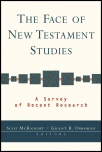
The Face of New Testament Studies brings together New Testament experts, including James D. G. Dunn, Bruce Chilton, David deSilva, Craig Evans, Craig Blomberg, Darrell Bock, Sean Freyne, and Donald Hagner, to track developments in their particular fields of research and to explain why those developments are important. The 22 contributors survey recent research into the historical, social, and literary contexts of the New Testament, recent advances in textual criticism and Greek grammar, and current issues in the interpretation of each New Testament book.
This book will be a timely reference for students and scholars of the New Testament as well as for pastors and interested readers who want to bring their awareness of New Testament studies up to date.
This survey of recent New Testament research is very useful, giving an excellent overview of the development of scholarly New Testament work within the last decades, especially in the English-speaking world. It shows ways of sober and convincing exegesis but also warns of dangers like fashion, fancy, fundamentalism, and hypercriticism. The interested reader will receive plenty of valuable information.
—Martin Hengel, emeritus professor of New Testament and early Judaism, University of Tübingen
This book is a gold mine of up-to-date information on what is going on in current New Testament scholarship. Methods and specialization have proliferated to the point where pastors, students, and even professors are at a loss to keep abreast of the entire field. In 22 chapters, members of this international group of scholars provide fresh overviews of their areas of expertise. Written in a lucid, accessible style, this book will handsomely repay every reader.
—Jack Dean Kingsbury, Aubrey Lee Brooks Professor of Theology Emeritus, Union Theological Seminary, Virginia
This excellent collection by a first-rate team of experts successfully orients readers to most of the major questions of the day. Although designed for students, it will also prove useful to scholars desirous of learning what has been going on outside their own narrow areas of specialization.
—Dale C. Allison, Errett M. Grable Professor of New Testament Exegesis and Early Christianity, Pittsburgh Theological Seminary
Discouraged over knowing more and more about less and less? Overwhelmed by the deluge of books and articles, all of which you should read by most of which you know you never will—even though they fall within your field of interest? If so, buy this book. It will tell you what’s happening in those innumerable other books and articles, and its authors form an all-star cast in their specialties. These essays are excellent for your education, both initial and continuing, in scholarly student of the New Testament.
—Robert H. Gundry, scholar-in-residence and professor emeritus of New Testament and Greek, Westmont College
This excellent introduction to several important and often highly complex issues demonstrates the value of context for understanding the New Testament. Theological students, pastors, and most professors of biblical studies will profit from careful reading of this volume. The essays are well researched, relevant, and readable. I highly recommend this volume.
—Lee M. McDonald, professor emeritus of New Testament studies, Acadia Divinity College
Scot McKnight is Karl A. Olsson Professor of Religious Studies at North Park University in Chicago, Illinois. He is the author or editor of numerous books, including Synoptic Gospels.
Grant R. Osborne is a professor of New Testament at Trinity Evangelical Divinity School in Deerfield, Illinois. He is the author of the Romans commentary in the IVP New Testament Commentary Series, Revelation in the Baker Exegetical Commentary on the New Testament, and co-editor of The Life Application Bible Commentary New Testament.
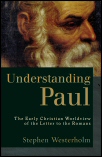
In his study of Paul, Stephen Westerholm suggests that despite the unparalleled influence the apostle has exercised over the last two thousand years, he is little understood by contemporary readers because they often read the Pauline Epistles from the largely unconsidered presuppositions of modern culture. To counter that perspective, Westerholm proposes investigating the mindset of Paul himself.
Westerholm’s well-crafted book presents an insightful survey of the apostle’s thought world. It focuses on the Epistle to the Romans as the most thorough and detailed account of Paul’s convictions regarding Christian life and doctrine. Westerholm uses the letter of Romans as a guide to the themes that were most important for the apostle, revealing the fundamental elements of Paul’s thought and the Jewish tradition from which it emerged. Following the thematic approach of the epistle, he considers each subject in the order it was taken up by Paul. Along the way, he delves into the writings of the Old Testament and their influence on Paul, presenting the issues in a manner that will challenge contemporary readers to rethink their ideas about faith, belief, and the life well lived.
Accessible yet challenging, written with clarity and lightness of touch, uncluttered with citations of secondary literature yet brimming with biblical references, this book aims to show you how Paul thought about life, while bidding you to think about your own—and it succeeds brilliantly in that aim. . . Highly recommended.
—R. Barry Matlock, lecturer, The University of Tennessee
If C. S. Lewis had been a biblical scholar, he would have written a book like this one. Westerholm combines scholarly precision, delightful prose, and a sympathetic reading of Paul to produce a book that is difficult for anyone—whether scholar, student, or curious inquirer—to put down.
—Frank Thielman, New Testament scholar and the Presbyterian professor of divinity, Beeson Divinity School
This is a sparkling introduction to Paul’s thought, written with uncommon verve. Westerholm uncovers the gap between Paul’s presuppositions and those of the modern West but provokes us into taking Paul seriously and widening our limited horizons. Students will find this an engaging guide to Paul in general and Romans in particular; scholars will be challenged to match Westerholm’s brilliance as a communicator.
—John M. G. Barclay, Lightfoot Professor of Divinity, University of Durham
It is difficult to imagine anyone who would not profit from this engaging and well-written introduction to Paul’s thought and world. Since Romans forms the basis of the engagement, Paul’s essential themes emerge. Westerholm has succeeded well in his task of showing moderns what makes Paul tick. This would be a great textbook in a course on the entire New Testament or on the epistles in which only one small volume had to serve to introduce Paul’s thought.
—William W. Klein, professor of New Testament, Denver Seminary
The goal is to make comprehensible the major components of Paul’s vision of life as they are raised in his most important letter. Its purpose is realized in an admirable way.
—Charles H. Talbert, distinguished professor of religion, Baylor University
Challenging, provocative, biblically informed, lucid, and well-written. . . I join with others in proclaiming that the book deserves a wide audience and sets a high standard for religious dialogue.
—Richard N. Longenecker, professor emeritus of New Testament, Wycliffe College, University of Toronto
Stephen Westerholm (DTh, Lund University) is an associate professor of religious studies at McMaster University. He is the author of Perspectives Old and New on Paul and Jesus and Scribal Authority.
Reviews
0 ratings
Precious Osasuyi Monday uhunoma
5/6/2022
[11]Having the glory of God: and her light was like unto a stone most precious, even like a jasper stone, clear as crystal; [12]And had a wall great and high, and had twelve gates, and at the gates twelve angels, and names written thereon, which are the names of the twelve tribes of the children of Israel: [13]On the east three gates; on the north three gates; on the south three gates; and on the west three gates. [14]And the wall of the city had twelve foundations, and in them the names of the twelve apostles of the Lamb. [15]And he that talked with me had a golden reed to measure the city, and the gates thereof, and the wall thereof. [16]And the city lieth foursquare, and the length is as large as the breadth: and he measured the city with the reed, twelve thousand furlongs. The length and the breadth and the height of it are equal. [17]And he measured the wall thereof, an hundred and forty and four cubits, according to the measure of a man, that is, of the angel. [18]And the building of the wall of it was of jasper: and the city was pure gold, like unto clear glass. [19]And the foundations of the wall of the city were garnished with all manner of precious stones. The first foundation was jasper; the second, sapphire; the third, a chalcedony; the fourth, an emerald; [20]The fifth, sardonyx; the sixth, sardius; the seventh, chrysolyte; the eighth, beryl; the ninth, a topaz; the tenth, a chrysoprasus; the eleventh, a jacinth; the twelfth, an amethyst. Revelation:21:11-20